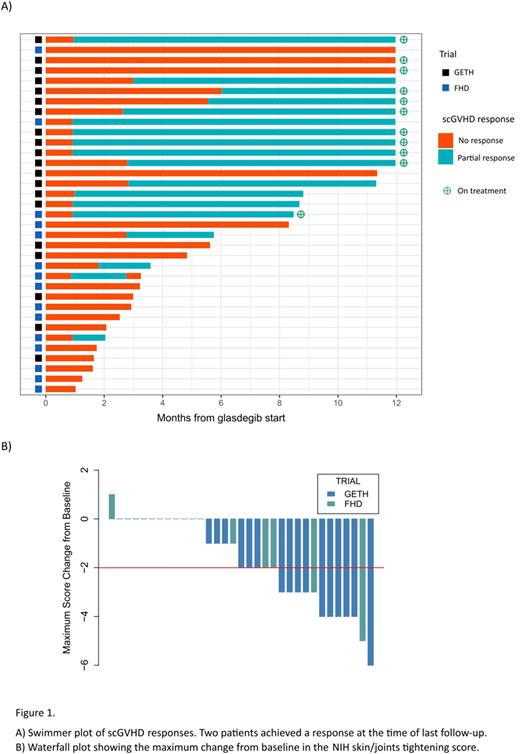Abstract
Introduction Sclerotic chronic graft vs. host disease (scGVHD) is characterized by progressive skin fibrosis that often causes limited mobility and poor quality of life. Aberrant activation of hedgehog signaling leading to the differentiation of dermal fibroblasts into collagen-releasing myofibroblasts has been implicated in scGVHD. Targeted inhibition with hedgehog pathway inhibitors ameliorate fibrosis in experimental models. Our objective was to determine the safety and efficacy of glasdegib, an oral antagonist of the hedgehog signalling transducer Smoothened (SMO) in adult patients (pts) with refractory scGVHD.
Methods Two independent, single-arm, open-label, phase I/II investigator-initiated studies [NCT03415867, Spanish Transplantation and Cellular Therapy Cooperative Group (GETH); NCT04111497, Fred Hutchinson Cancer Center/Huntsman Cancer Institute/Duke University Medical Center (FHD)] were performed. Adults with active scGVHD after ≥1 (FHD) or ≥2 (GETH) lines of prior therapy were enrolled.
The GETH trial followed a 3+3 dose-finding strategy, whereas the FHD trial employed a fixed-dose design. Primary endpoints were dose-limiting toxicity (DLT) and maximum tolerated dose (MTD) in the GETH trial, and safety and tolerability in the FHD trial. Secondary endpoints included efficacy, patient-reported outcomes and biological correlates of response. Glasdegib was administered once daily in continuous 28-day cycles. Individual organs were scored per 2014 NIH cGVHD criteria. A scGVHD partial response (PR) was defined as skin and/or joints score improvement (≥1 point for body surface area [BSA], skin features or joints/fascia scores; ≥2 points for skin/joints tightening or total P-ROM scores) in the absence of worsening in those scores or an increase ≥2 points in the global severity score. Data cut-off was at 12 months from time of glasdegib initiation.
Results Twenty (GETH) and 15 (FHD) pts were enrolled who received a median of 4 (range 2-10) and 4 (1-16) prior lines of therapy. The median age was 47 years (range 27-73) and 64 (33-74) in the GETH and FHD studies, respectively. In the GETH trial, 3 pts were included in cohort 1 (50 mg), 3 in cohort 2 (100 mg) and 16 in the expansion cohort (50 mg). All pts in the FHD trial received glasdegib at an initial dose of 50 mg.
Frequent treatment-emergent grade (G) ≥2 adverse events (AEs) in the GETH trial included muscle cramps (85%), alopecia (50%) and dysgeusia (35%). Two pts in cohort 2 experienced a DLT (G3 muscle cramps) that resulted in establishment of the MTD at 50 mg. Similarly, G3 muscle cramps were the most frequently reported adverse event (AE) occurring in 33% of pts in the FHD trial. In the FHD study, a pre-specified trial stopping rule was triggered by the emergence of G3 muscle cramps AEs in 5 pts.
In the GETH trial, glasdegib dose reductions were undertaken in 10 pts, and 8 pts stopped glasdegib before completion of 12 cycles of therapy. Ten pts remained on treatment beyond 12 months. In the FHD trial, the glasdegib dose was reduced in 5 pts; 12 pts stopped glasdegib before 12 cycles. Two pts remained on treatment for longer than 12 months and one pt remains on glasdegib at 10 months.
At the 12-month data cut-off, 9 (45%) pts in the GETH trial achieved a skin BSA score and/or sclerotic features score PR, and 9 (45%) pts had obtained a joints/fascia score response (6 PRs, 3 complete responses). Corresponding findings in the FHD trial were 4 pts (27%; 3 PRs, 1 CR) and 3 pts (20%; 2 PRs, 1 CR). An improvement ≥2 points in the total P-ROM score was observed in 11 (55%) pts in the GETH study and 4 (27%) pts in the FHD study, Additionally, an improvement ≥2 points in the 0-10 skin and/or joint tightening severity scale was reported in 13 (65%) and 4 (31%; 2 pts with missing data) pts in the GETH and FHD trials, respectively. Overall, 13 (65%) pts obtained a scGVHD PR in the GETH trial, with a median time of 2.4 months to response. Likewise, 7 (47%) pts had a scGVHD PR in the FHD group, with a median time of 0.9 months to response.
Preliminary correlative studies did not show changes in the distribution of T-cell subpopulations or TCR diversity in the GETH trial.
Conclusions Glasdegib demonstrated high rates of clinical activity in heavily pretreated pts with scGVHD, but tolerability was hampered by the emergence of treatment-related muscle cramps. Yet, selected pts derived a sustained benefit from treatment in the absence of limiting toxicities.
Disclosures
Rodriguez Arbolí:Pfizer: Honoraria, Other: travel/conference grants; MSD: Consultancy; Jazz Pharmaceuticals: Consultancy; Eurocept: Consultancy. Lee:BMS: Consultancy, Membership on an entity's Board of Directors or advisory committees; Kite: Consultancy, Honoraria, Membership on an entity's Board of Directors or advisory committees, Speakers Bureau; Jazz: Consultancy; Fresensius Kabi: Consultancy; CareDx: Consultancy; Incyte: Consultancy, Membership on an entity's Board of Directors or advisory committees, Research Funding; Kadmon: Consultancy, Membership on an entity's Board of Directors or advisory committees. Sarantopoulos:Rigel Pharmaceuticals: Other: receives supplies for clinical trials. Lee:Equillium: Consultancy, Honoraria; Kadmon: Consultancy, Honoraria, Research Funding; Amgen: Research Funding; AstraZeneca: Research Funding; Incyte: Research Funding; Pfizer: Research Funding; Syndax: Research Funding; Novartis: Other: Steering Committee; Amgen: Research Funding; AstraZeneca: Research Funding; Incyte: Research Funding; Kadmon: Consultancy, Honoraria, Research Funding; Pfizer: Research Funding; Syndax: Research Funding; National Marrow Donor Program: Membership on an entity's Board of Directors or advisory committees; Mallinckrodt: Consultancy, Honoraria. Perez-Simon:Novartis: Consultancy, Honoraria, Membership on an entity's Board of Directors or advisory committees, Other: Travel, Accommodations, and Expenses; Janssen: Consultancy, Honoraria, Membership on an entity's Board of Directors or advisory committees, Other: Travel, Accommodations, and Expenses; GILEAD: Consultancy, Honoraria, Membership on an entity's Board of Directors or advisory committees, Other: Travel, Accommodations, and Expenses; JAZZ: Consultancy, Honoraria, Membership on an entity's Board of Directors or advisory committees, Other: Travel, Accommodations, and Expenses; ALEXION: Consultancy, Honoraria, Membership on an entity's Board of Directors or advisory committees, Other: Travel, Accommodations, and Expenses; ABBVIE: Research Funding; PFIZER: Research Funding.
OffLabel Disclosure:
glasdegib treatment for chronic GVHD
Author notes
Asterisk with author names denotes non-ASH members.


This feature is available to Subscribers Only
Sign In or Create an Account Close Modal